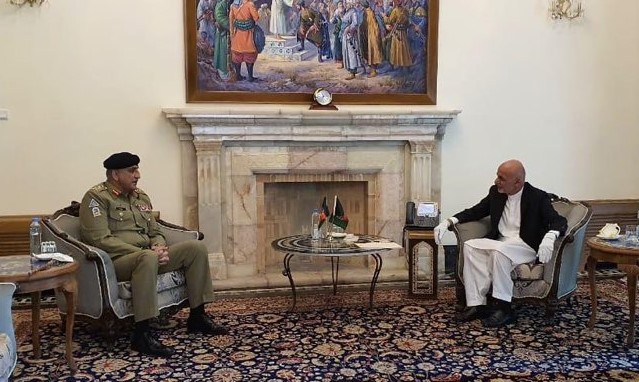On June 9, Pakistan Army Chief Gen Qamar Javed Bajwa went to Afghanistan, unannounced. This is the first visit by a prominent Pakistani after the US-Taliban peace deal in February this year. It’s also the first prominent Pakistani visit after the results of Afghanistan elections.
Prima facie Bajwa’s visit seems very crucial for Afghanistan, America and Pakistan, but when looked in the light of recent developments this visit seems to serve only the interests of Pakistan and Taliban. As can be seen that despite the agreement between US and Taliban, there is no change in the internal turmoil and violence in Afghanistan. According to the official figures of the Afghanistan government, more than 3,800 attacks have taken place killing 420 people and injuring thousands of others.
Let’s have a look at some of the developments in recent past. On May 13, around 24 people were killed in the maternity hospital attack in Kabul, including two new born, mothers and nurses. On March 30, around 21 security forces were killed by Taliban in Thakar province. Fighting against security forces for their political aspiration is one thing but killing innocent newborn babies and attacking hospitals are heinous crimes and this is what Taliban backed by Pakistan has always done in Afghanistan for attaining their political aspiration.
Killing of innocent also includes names like Tetsu Nakamura, a Japanese physician and philanthropist who had devoted his 19 years for Afghanistan where he built canal projects from the Kunar River in eastern Afghanistan and was credited for transforming the desert of Gamberi on the outskirts of Jalalabad into lush forests and productive wheat farmlands. Tetsu Nakamura had also constructed two hospitals and two mosques. On December 4, 2019, as Nakamura was heading to work in his aid vehicle in Jalalabad, Afghanistan, he was assassinated by gunmen along with his bodyguards and driver.
Also look at Pakistan’s connection with Taliban. Taliban is supported by various small groups like the Quetta Shura, Haqqani network, Hzeb-e-Islami Gulbuddin and smaller al-Qaeda group among which the leader of Quetta Shura is quite often regarded as the head of Taliban. It’s quite clear by name ‘Quetta’ in Quetta Shura that it works from Quetta, Balochistan or it has something to do with Quetta. Quetta Shura was introduced by Mullah Omar who served as Taliban’s Chief for several years. He had graduated from Darul Uloom Haqqaniya in Khyber Pakhtunkhwa, Pakistan. A contemporary of Osama bin Laden, Mullah Omar had ordered Taliban to destroy the Buddha of Bamiyan.
According to a retired General of the United States Army, Stanley A. McChrystal, the Quetta Shura is directing the Afghani Taliban insurgency. In a report to President Obama in 2009, he stated that it posed the greatest threat to his troops. He said, “Afghanistan’s insurgency is clearly supported from Pakistan. The Quetta Shura conducts a formal campaign review each winter.” In September 2009 US Ambassador to Pakistan Anne W. Patterson said, “In the past, we focussed on al-Qaeda because they were a threat to us. The Quetta Shura mattered less to us because we had no troops in the region, now our troops are there on the other side of the border, and the Quetta Shura is high on Washington’s list.”
These claims becomes more important when one looks at what the Pakistani senator Abdul Rahim Mandokhel from Zhob in northern Balochistan had stated. “The whole war in Afghanistan is being launched from here,” Abdul Rahim Mandokhel had said. A report submitted by author Matt Waldman to London School of Economics (LSE) claims that Pakistan’s relationship with the Taliban ran far deeper than previously realised.
Based upon these evidence, it’s clear that Pakistan’s ISI and their senior government officials believe that Quetta Shura (Taliban) would be valuable assets if Taliban would somehow regain power after a withdrawal of US forces from Afghanistan.
Interestingly, just after two days of Ghani-Bajwa meeting, Ashraf Ghani has stated that the release of Taliban prisoners will be completed shortly. So has Pakistan and the Taliban once again stepped forward in their proxy war? It still looks like conundrum for now!

